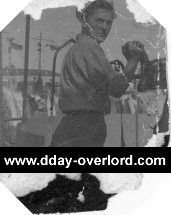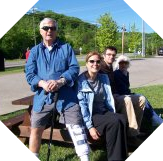Testimony of Clifford G. Porter
D-Day veteran
George W. Parker was a sailor aboard an American landing craft. His ship participated in the landing of soldiers on Omaha Beach on June 6, 1944. He made several Channel crossings throughout the Normandy Campaign and also participated in amphibious operations during the Provence landings.
After the war, he donated all his belongings to the Winchester Memorial Museum in Virginia, USA. He was also the main subject of a documentary film aimed at younger audiences.
“At that time, I was a sailor aboard the LCI (Landing Craft Infantry) number 516. We crossed the Atlantic from January to February 1944, during an eighteen-day crossing. Between February and June 1944, we spent most of the time preparing and training for the big day, D-Day.

Clifford G. Porter at the controls of the 20mm cannon that armed LCI #516, of which he was one of the sailors. Private collection
On June 5, 1944, we left the English port of Portsmouth at 10:30 p.m. and headed for Omaha Beach. We were to land assault troops on the Easy Red beach sector. Our LCI was part of a convoy of several LCIs that were to land their troops (American soldiers) simultaneously. After a rather rough crossing of the English Channel due to the storm, we arrived off the beach around 6:30 a.m., while the bombardment of the coast and the landing were already underway.
My position was as a gunner on a 20mm cannon located on the bow of the ship. From there, I had a very good view of what was unfolding in front of our landing craft. I saw death and destruction up close that very morning.
We tried more than once to force our way to the beach. Thus, it was never necessary for us to release the anchor: we simply had to run the engines at full throttle in reverse to move away from the beach.
Our role was to transport soldiers from the ships stationed offshore to the shore. But while some of the LCIs in our convoy had begun disembarking, others were coming under cannon fire and shells and were hit, unable to advance further. From that precise moment on, the general staff decided to no longer use the LCIs to disembark the infantrymen and to leave the task to the smaller LCVP-type barges, which were certainly more difficult for the German gunners to reach.
Securing Omaha Beach for our infantrymen was particularly difficult. On the evening of June 6, 1944, we sailed to the British sector of Gold Beach, then early in the night we returned to Portsmouth to embark 200 British soldiers.
The next morning, we landed them at Gold Beach after another Channel crossing. Our ship got stuck on the sand by the falling tide while we landed the Tommies, which gave us some time to get to the beach before putting back to sea. I was able to go to the top of the dunes to a bunker where I recovered a German helmet. Along the beach, I could see the rows of Canadian soldiers killed in action waiting to be buried.”

Clifford G. Porter and his family in the United States. Private collection.
